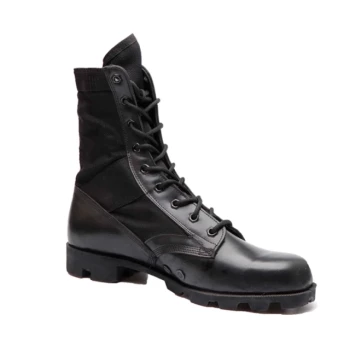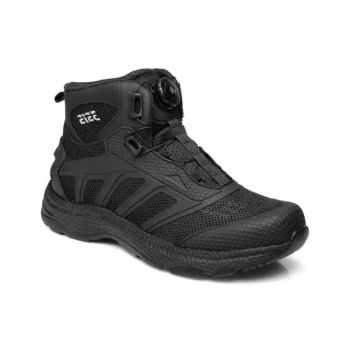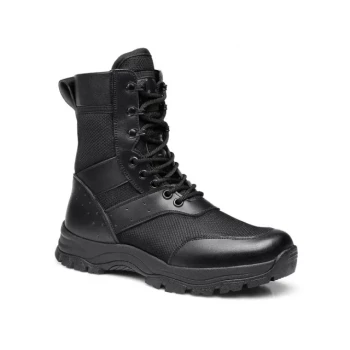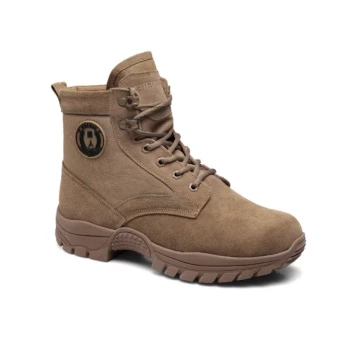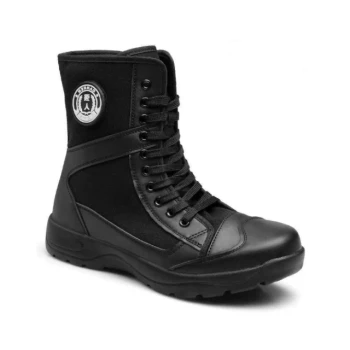Wearing ill-fitting wellington boots is a significant health hazard, not merely a source of minor discomfort. The risks range from immediate surface-level injuries, such as blisters and abrasions, to systemic issues affecting blood circulation. Prolonged use of poorly sized rubber boots can trigger a chain reaction of musculoskeletal disorders extending from your feet to your spine.
While the immediate symptom of a bad fit is localized discomfort, the true cost is often long-term structural damage. Your boots serve as the foundation for your body's alignment; when that foundation is compromised by a fit that is too tight or too loose, the stress transfers upward, leading to potential chronic injuries in the knees, hips, and back.
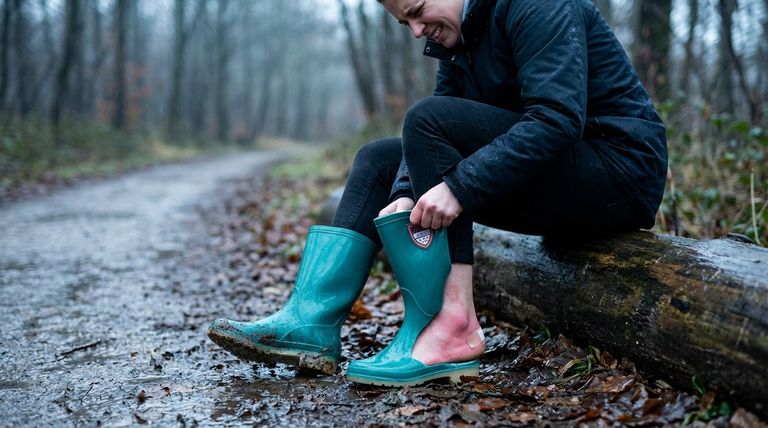
The Risks of Compression (Too Tight)
Circulatory Compromise
When wellies are too tight, they act as a tourniquet around the foot and calf. This restricts blood circulation, posing a serious risk for individuals who spend long hours on their feet.
Poor circulation can lead to numbness, increased sensitivity to cold, and fatigue. Over time, this exacerbates issues like varicose veins or swelling.
Nerve and Ligament Strain
Tight footwear forces the foot into unnatural positions. This creates strain on ligaments, muscles, and nerves, potentially leading to chronic pain conditions.
Continuous compression can also contribute to conditions like fallen arches and flat feet by preventing the foot's natural splay and movement.
The Risks of Instability (Too Loose)
Friction and Skin Integrity
"Baggy" or loose wellies allow the foot to slide inside the boot with every step. This constant friction inevitably causes blisters, sore spots, and abrasions.
Once the skin barrier is broken, the warm, damp environment of a rubber boot increases the risk of infection.
Water Ingress
A loose fit at the calf or ankle compromise the boot's primary function: waterproofing. Baggy tops allow water to enter easily, rendering the boots ineffective in wet conditions.
Wet feet inside rubber boots significantly increase the likelihood of trench foot and fungal infections.
Systemic Musculoskeletal Impact
The Kinetic Chain Reaction
The impact of heavy, ill-fitting footwear is not isolated to the foot. It causes secondary injuries to the neck, spine, knees, or hips.
When your foot strikes the ground improperly due to a poor fit, your body compensates by altering your gait. This misalignment travels up the "kinetic chain," stressing joints far above the ankle.
Plantar Fasciitis
Both tight and loose boots contribute to plantar fasciitis, a painful inflammation of the tissue connecting the heel bone to the toes.
Tight boots compress the fascia, while loose boots lack the necessary arch support, causing the fascia to overstretch and tear.
Understanding the Trade-offs
The "Break-in" Myth
A common pitfall is assuming wellies will stretch like leather boots. Rubber does not break in; the fit you have in the store is the fit you will have forever.
Attempting to "tough out" a tight pair of wellies will not result in a better fit, only foot injury.
Premature Equipment Failure
Beyond health risks, there is an economic trade-off. Ill-fitting boots suffer from excessive wear and tear.
When a foot slides inside a loose boot, it stresses the lining and structure from the inside out. This reduces the boot's lifespan, necessitating early and frequent replacement.
Making the Right Choice for Your Health
To mitigate these risks, you must prioritize fit over aesthetic or price. The goal is to lock the heel in place while allowing the toes to wiggle.
- If your primary focus is Long-Duration Work: Prioritize a snug fit with arch support to prevent circulatory issues and plantar fasciitis during long shifts.
- If your primary focus is Wet Weather Protection: Ensure the calf fit is close enough to prevent water ingress but loose enough to accommodate blood flow.
- If your primary focus is Joint Health: Select lighter-weight options to reduce the strain on knees and hips associated with heavy, clunky footwear.
Your footwear is the primary interface between you and the ground; compromising on fit is compromising your long-term mobility.
Summary Table:
| Risk Category | Key Consequences |
|---|---|
| Too Tight (Compression) | Poor circulation, nerve strain, chronic foot pain |
| Too Loose (Instability) | Blisters, water ingress, trench foot, fungal infections |
| Systemic Impact | Altered gait, knee/hip/back pain, plantar fasciitis |
| Economic Cost | Premature boot failure, frequent replacement costs |
Don't let poor footwear compromise your safety and productivity. As a large-scale manufacturer, 3515 produces a comprehensive range of durable, properly-fitting wellington boots for distributors, brand owners, and bulk clients. Our production capabilities ensure you get the right fit for long-lasting comfort and protection. Contact us today to discuss your footwear needs and secure a foundation for better health.
Visual Guide
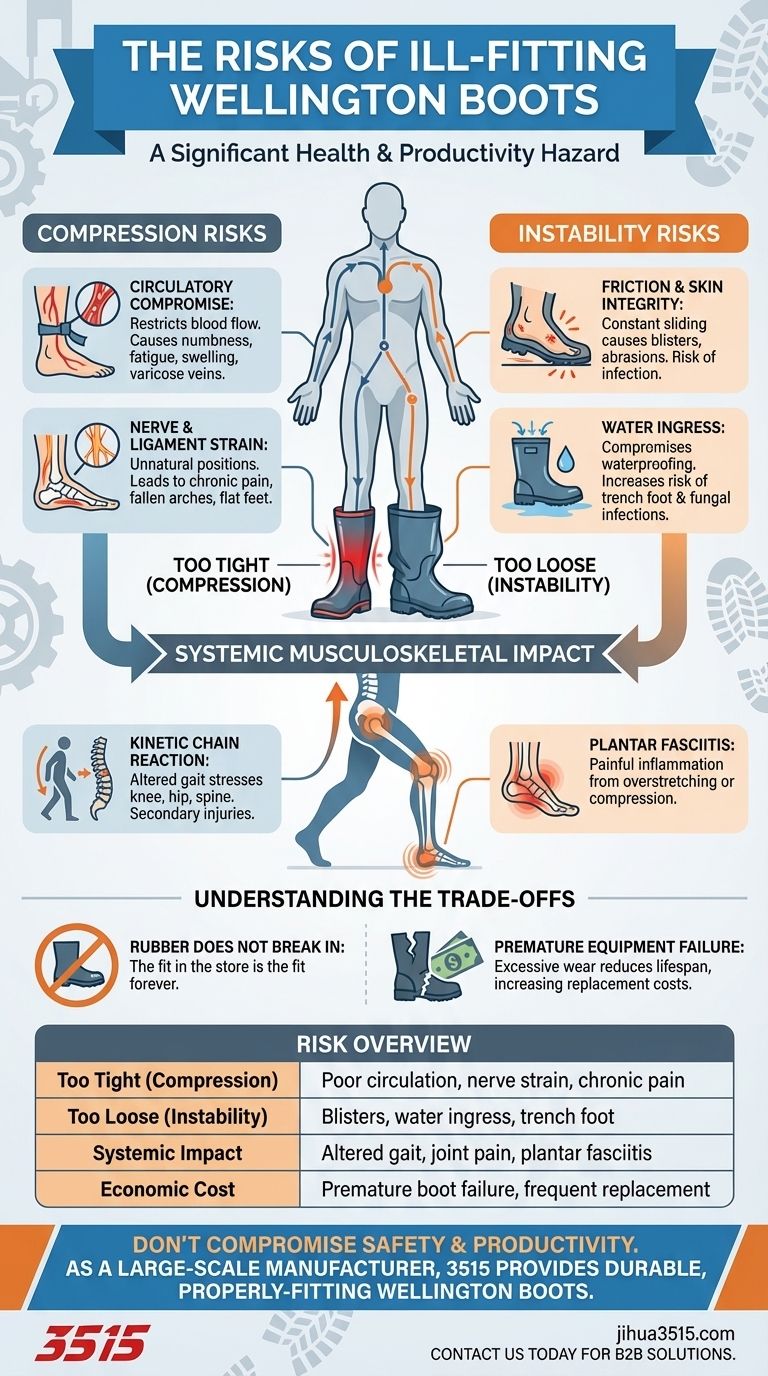
Related Products
- Factory Direct Wholesale Rain Boots Durable Waterproof & Fully Customizable
- Safety Footwear Wholesale Manufacturer for Custom OEM/ODM Production
- Factory-Direct Wholesale Canvas Boots with High-Traction Rubber Soles
- Premium Flame-Retardant Waterproof Safety Boots and Shoes
- High Performance Fire-Retardant Waterproof Safety Boots
People Also Ask
- Are Wellington boots typically oversized? The Truth Behind the Roomy Fit
- What should be considered about the sole unit when choosing wellington boots? Find the Perfect Grip & Comfort
- What are the benefits of adjustable wellington boots and short wellies? Find Your Perfect Fit for Any Activity
- How can wellington boots be repaired to extend their lifespan? A Guide to Lasting Wear
- What are the pros and cons of rubber-lined wellington boots? A Guide to Versatile, Durable Footwear
- How do the heights of rain boots and snow boots compare? A Guide to Weather-Ready Footwear
- What factors contribute to the fit and comfort of women's wellies? A Guide to All-Day Comfort
- Does the lining of Wellington boots affect the sizing? A Guide to Getting the Perfect Fit








